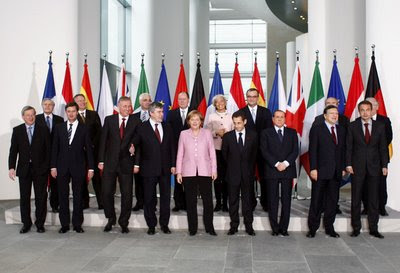
G 20 attracts bouquets and brickbats equally. This time in London it promised to unearth black money stocked in advanced countries. If the promise turns into a reality, G 20 future is bright.
N. Ravi writes in The Hindu, 27 April 2009,
The London G20 summit may not quite have been another Bretton Woods that brought the World Bank and the International Monetary Fund into being in the 1940s, as some billed it. Nor did it go so far as to provide a new moral compass for the world economy in which the excesses of the financial system were seen as the precursors of the recession. Yet, its final declaration and the sentiment that came through the discussions showed a sensitivity to the issues of equity both within countries and in the international economy as a whole that was unprecedented.
From the standpoint of the developing countries, three of the outcomes were particularly significant and constitute a favourable environment in which the new government that is to take office in
The second issue of longstanding concern for
The third relates to tax havens and illicit money flows from criminal activity, tax evasion, corruption and embezzlement of public funds and was the focus of much media attention before the
It is uncertain if the same proportion — corruption and embezzlement by public officials accounting for 2 to 4 per cent of the total illicit money flows — would apply to
Much of the money is held in hard currency in offshore financial centres and tax havens but it also finds its way ultimately into the major financial centres of Europe and North America. Low or nil tax rates, particularly on income earned abroad, banking secrecy, shell companies and trusts operated by lawyers and accountants, a policy of non-cooperation with tax investigators in other countries and a generally non-questioning, permissive atmosphere characterise the functioning of tax havens. To counter illicit flows, three types of international programmes are currently in operation. The first is the anti-money laundering initiative of the Financial Action Task Force (FATF) set up by the G7 and functioning at the Organisation for Economic Cooperation and Development secretariat. This focuses on measures to combat laundering the money from crime including drug running and comprises a set of 40 recommendations on criminalising money laundering, customer due diligence to be exercised by banks, not providing anonymous accounts or accounts in fictitious names, verifying the identity of the beneficiaries and the source of funds and monitoring accounts for suspicious activity, as well as cooperating with investigators in other countries.
The second coordinated effort is to counter tax evasion and the OECD is at the forefront of this initiative. It has formulated a code for exchange of tax information and Article 26 of its Model Tax Convention on Income and Capital which is the gold standard for tax treaties requires all countries to lift banking secrecy and “exchange such information as is foreseeably relevant” to the enforcement of tax laws of another country. It adopted a policy of naming and shaming countries that do not comply with this requirement, and many former tax havens and financial centres that were for long reluctant to help in investigations of tax evasion committed themselves to the OECD standard, among them Switzerland, Austria, Luxembourg, Hong Kong and Singapore. At the end of the
The third area of international action that is of particular relevance to the debate in
The most important multilateral agreement that provides the framework for combating corruption and recovering stolen money is the United Nations Convention Against Corruption that came into force in December, 2005. There are 140 signatories to the convention of whom 115 have also ratified it;
After the G20 London summit, the international environment has turned much less permissive to the holding of criminal or tax evaded money or money stolen from the public coffers. Yet, going after it is no easy task and involves three major challenges for any new government. First, it needs to summon the political will to go after all kinds of money that has been illicitly taken out — and this includes the funds stashed away by politicians from corrupt deals, by businessmen through trade mispricing and transfers of unaccounted money and by major criminals. Secondly, the new government needs to pursue the task of unearthing the money hidden abroad aggressively with other governments. It must ratify the UNCAC without further delay and enter into OECD-type tax conventions for the removal of banking secrecy for tax investigations with all the major financial centres.
Thirdly, the domestic investigative and legal framework needs to be strengthened to gather credible evidence and lead on to the quick conclusion of trials and forfeiture of property. The evidence gathered domestically has to form the basis for any request for assistance from other countries that will not entertain general or fishing enquiries. The names of the account holders in the LGT Bank in Liechtenstein bought by the German government from a former employee of the bank or the list of American account holders given over to the United States by the UBS of Switzerland to settle charges of violating Securities and Exchange Commission regulations are exceptional events that do not change the general rule that there must be a substantiated request naming a specific person and the bank. It is no doubt a long and hard road that is ahead but the scale is so vast and the rewards are so huge that the task needs to be attempted with seriousness and resolve.
No comments:
Post a Comment